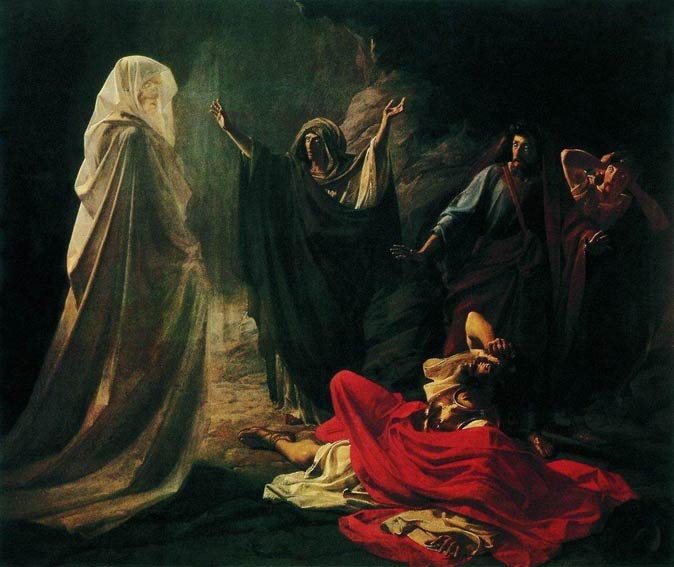A Halloween Meditation: The Witch of Endor

What do we really know about witches? Tragically, throughout much of history, witches have been tortured—and in the name of religion. Yet the only witch in the Bible, the Witch of Endor (1 Samuel 28:3-25), was a kind and compassionate soul who brought light to a troubled king. Her story, unknown to most contemporary Christians and Jews, has been noted with great interest over the centuries by many writers, theologians, and poets, including Lord Byron:
I have always thought this the finest and most finished witch scene that ever was written or conceived, and you will be of my opinion if you consider all the circumstances of the actors of the case, together with the gravity, simplicity and density of the language. It beats all the ghost scenes I have ever read.
Consider then, if you will, her actions (adapted from Bible Women: All Their Words and Why They Matter).
The Witch of Endor
Picture an older woman, living alone in a hillside cave, outside a small town of Endor in the year 1010 BCE. She is known by several names: fortune teller, medium, witch. An outcast, she supports herself through her remarkable ability to predict the future. Most jobs are closed to females; she exercises one of the few vocations in biblical times where a woman can earn a few cents.
On a night unlike all others, an old man stumbles to her door, asking her to roust a friend from the afterlife. She refuses, telling him that King Saul has banned such activity. For all she knows, the man dressed in rags is employed by Saul to find and arrest lawbreakers like her.
“There will be no punishment,” says Saul. “Trust me.”
She takes a chance, inviting him inside.
“Who is it you wish to speak with?”
“Samuel,” he says. “Samuel.”
The woman invokes the spirit of Samuel—and then screams—for as he appears, she realizes that she is caught between between two of Israel’s most powerful men. The first, Samuel is dead. The second, Saul, is mentally ill and exhausted. Neither are in good spirits. Samuel, the son of Hannah, was the last judge of Israel, the one who anointed both Saul and David as kings of Israel, and who oversaw the troubled country in the particularly violent pre-monarchy days.
Grumpy that he has been brought back from the afterlife, Samuel does not lighten the mood. Instead, he announces that death will take the king the very next day. Samuel disappears, and Saul falls to the ground. In addition to hearing his fate, he has not eaten in over twenty-four hours.
With deep compassion, the old woman begs the exhausted monarch to stay for a bite of bread so that he might have strength for the morrow. First he refuse, then accepts. Knowing that by her hand will come Saul’s last meal, she prepares a meal that is indeed fit for a king.
As was foretold that night because of her action, Saul dies the next day on the battlefield. Knowing that his life is to end and not wanting to die by the hands of Philistines, he falls on his own sword, thus ending the tenure of the first king of Israel.
Consider this
Ostracized for most of her life, the witch of Endor has finally found a place where she can live in relative safety and practice her vocation. When the knock on her door comes, then, she is justifiably concerned, for she has learned who is trustworthy and who is not.
Before her stands an old man: alone and scared. But trusting her instincts, she takes him inside. And no wonder he has sought her out—the only person he could trust to give him reliable advice, Samuel, was dead. What could be worse than being chased by evil spirits, imposed by God?
Reaching outside her comfort zones for fear of arrest, she summons Samuel. And when he arrives, she is terrified. No wonder she screams. Yet she stays at the cave with Saul until he leaves.
Like Mary of Bethany washing and anointing Jesus’ feet with priceless oil, (John 12:1-8) the woman offers Saul her most valuable material resource: a fatted calf. Like Mary, who gave Jesus the strength to walk to the cross, the witch gives Saul physical and emotional support during his last hours. Like the Last Supper, she feeds the troops, providing the king and his men—who wait outside—one last meal together.
A wonderful witness…a kind woman…and one who was not afraid to go between this world and the next, even in the face of great danger and sorrow.
What might we learn from the Witch of Endor?
Be insistently generous.
Consider all gifts to be from God and use them wisely.
People who seek healing are often hungry, in more ways than one.
Give what you can while you can.

